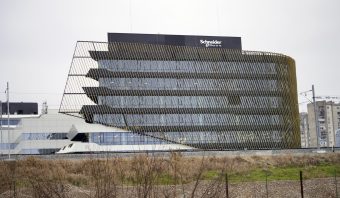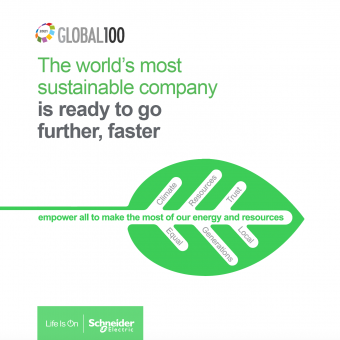
EP: At the end of January, Schneider Electric announced the extension of its long-term strategy in the fields of environment, society and corporate governance to all its activities and committed itself to help its customers and business partners achieve their sustainability goals. How do you plan to implement it?
Ksenija Karić: As a company that represents a global leader in the digital transformation of energy management and automation, we believe it is our duty to contribute to making the world a more sustainable, greener and inclusive place. We have long been committed to these principles. We are constantly raising the bar of quality for ourselves, our customers and partners, and the fact that back in 2005, we were the first to monitor the impact we had on people, the planet and profit, using the Barometer of sustainability. We have recently adopted a new program called Schneider Sustainability Impact (SSI), which covers the period from 2021 to 2025 and implies a significant expansion of the previous goals. It is based on six long-term commitments to meet each of the United Nations sustainable development goals. These commitments include working towards a climate-positive world, efficiency with resources, respect for the principles of trust, creating equal opportunities, giving opportunities to all generations and empowering local communities.

We saved 120 million tons of CO2 emissions over the last 15 years and provided access to energy for about 30 million people worldwide. We help our customers and clients to operate in accordance with the principles of sustainability. For example, the American company Walmart turned to us to help them green their business. By implementing our solutions in the next 10 years, we will help them save 1 gigaton of carbon, while in 2020, more than 2,000 of their suppliers saved more than 230 million tons of carbon – almost a quarter of a ten-year goal. That came after Schneider Electric helped them adopt energy systems based on renewable sources. We have developed applications, analytics, and services that use IoT data to identify additional energy efficiency opportunities, increase asset life, optimize maintenance services, and increase demand flexibility and renewable electricity. The Edge Control option provides the ability to manage on-site operations, with daily optimization of power consumption via remote access and advanced automation. Related products are eco-friendly designed to improve their efficiency and enable electricity savings.
EP: Your company is on the prestigious annual list of Corporate Knights as the most sustainable corporation in the world. What does this recognition mean to you?
Ksenija Karić: The first place on the list of the Global 100 most sustainable corporations in the world for 2021 represents a huge leap from the 29th place we had last year. It is also an expert external confirmation of the long-term commitment to environmental, social and corporate governance (ESG) issues. Our goal is to be an example to others when it comes to our business and ecosystem and we strive to be part of the solution for our clients. It means a lot to us that this prestigious media and research company dealing with performance in corporate sustainability has seen our efforts and turning point to data centers, data warehousing and other energy distribution resources and smart solutions that promote electrification, energy efficiency and renewability. Today, 70 percent of our revenues come from sustainable solutions, and that is what provides 73 percent of our total investments.
In focus:
EP: Schneider Electric participated in preparing the report “Net-Zero Carbon Cities – Systemic Efficiency Initiative”. What are the conclusions of this report?
Ksenija Karić: It is a global framework that defines the vision of accelerated work on decarbonization and sustainability in cities around the world. It is an initiative in which we participate with Enel Group, a multinational energy company and a leading integrated player in global energy, and the World Economic Forum (WEF), and was created to emphasize the need and benefits of an integrated energy approach to building planning and management, mobility, use digitized and intelligent grid infrastructure in an urban context. Unfortunately, cities today participate in global CO₂ emissions with almost 70 percent and consume 78 percent of the planet’s energy, making this approach key to achieving the goal of limiting global temperature growth by 1.5 °C as compared with pre-industrial levels. Given these negative trends, it is necessary to emphasize the need for an integrated approach to improving energy productivity, electrification of transport, decarbonization of heating and cooling systems, enabling flexibility of demand, and giving specific recommendations and sharing experiences regarding these concepts. Since launching the initiative, a year ago, Schneider Electric and Enel have been working with the community to accelerate the transition to zero net CO₂ emissions in 100 cities by 2030. In addition to this document, tools, an interactive platform and instruments for measuring the progress of cities towards a green and sustainable transition will be developed. Each of these elements will be the result of close cooperation between large cities and several city networks and senior representatives of academia, NGOs, industry and finance

EP: Schneider Electric is a real example of sustainable business in Serbia as well, and moving to new, more modern premises is another confirmation of that commitment. What systems have you applied in the new space, and what do they enable?
Ksenija Karić: We have moved to one of the most attractive locations in the capital and we have implemented our solutions in the field of electricity distribution and Building Management System in the new space. We have connected various systems, such as switchboards, access control, heating, air conditioning, lighting and more, into a unique, automated real-time monitoring and control system, which we can access via the application even when we are out of the office. Such an automated system of supervision and management contributes to improving operational and energy efficiency in business with a significant reduction in total costs. The Belgrade office of our Development Center is at the same location.
EP: When we talk about sustainability, the question of transport always arises. Some predictions say that by the end of the next decade, every third car sold in the world will be electric. Where do you stand in the development of this sector?
Ksenija Kari: We recognized these trends, and to achieve the ambition to achieve net-zero operating carbon emissions by 2030, we joined The Climate Group # EV100 initiative, which includes the replacement of 14,000 company cars with electric vehicles. We believe that electricity is the future of mobility and that a good infrastructure of the electric charger network is the starting point for sustainability. It is also necessary for electric chargers to be compatible with different types of electric vehicles. We have a lot of experience in this field. There are about 100,000 electric vehicle charging points supplied by Schneider Electric in Europe. When we talk about Serbia and Montenegro, about 100 electric chargers have been installed so far.
Read the story in the new issue of the Energy portal Magazine CIRCULAR ECONOMY march 2021.-may 2021.



